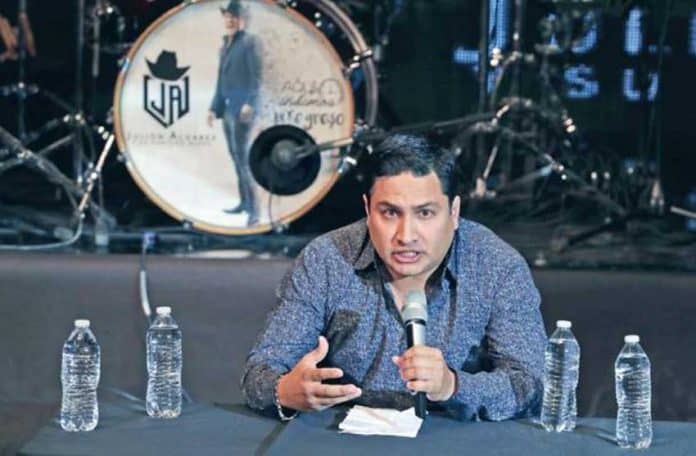Grammy-nominated singer Julión Álvarez said Saturday that he has been taken off a black list in Mexico for alleged links to organized crime, but he remains on the United States’ kingpin list.
“I feel satisfied and happy that today I can say that Julión Álvarez Montelongo has been removed from that list . . .” the singer told a press conference before a concert in Los Mochis, Sinaloa.
The financial intelligence unit of the Secretariat of Finance (SHCP) blocked Álvarez’s bank accounts earlier this year due to his alleged involvement in drug trafficking, while the United States Department of Treasury placed him on that country’s kingpin list last August.
In a statement issued at the time of the kingpin designation, the Treasury Department said that Álvarez and 20 other Mexican nationals, including soccer player Rafael Márquez and 42 entities in Mexico had provided “support to the narcotics trafficking activities of Raúl Flores Hernández,” a capo known as “the least known drug lord” and “El Tío” (The Uncle).
For Álvarez, the designation meant the immediate cancelation of his U.S. visa, the freezing of any assets he held in the United States and a prohibition against any U.S. company from conducting business with him.
The banda singer has denied the allegation, and Álvarez said he initiated legal action as soon as the SHCP included him on its list.
“Since we were incriminated, my team and I decided to start proceedings here in Mexico to be excluded from the list of blocked persons,” he said.
“We supplied all the information that we were asked to. We submitted bank accounts, documents and everything that was needed to show where I obtained my assets, everything that was needed so that we were removed from the list.”
Álvarez explained that he regained access to his bank accounts on July 10 but added that the legal battle isn’t over because companies he owns are still on the SHCP black list. However, he’s hopeful that they too will soon be removed.
“We are confident that in the coming days, everything will be fixed . . .” Álvarez said.
Mexican and U.S. law enforcement authorities announced earlier this month that they would strengthen cooperation in the fight against drug cartels and organized crime but Álvarez’s case is one on which the two countries appear to be on different pages.
Source: El Universal (sp)
